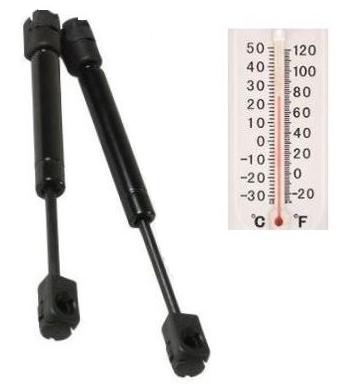Does Temperature Affect Gas Spring Pressure?

The answer is Yes! Temperature can be a very big factor in how a gas spring operates in an application. The gas spring cylinder is filled with nitrogen gas and the higher the temperature, the faster the gas molecules move. The molecules moving faster, causes the volume of gas and pressure to increase which makes the gas spring stronger.
The opposite is true when the temperatures drop. The colder the temperature, the more the nitrogen gas molecules slow down and the pressure drops within the cylinder making the gas spring weaker.
Knowing the temperature environment your gas spring will be used in for the majority of the time is helpful. It will allow you to engineer the best mounting points and proper gas pressure to try to compensate for the temperature. More often than not, you won't be able to compensate for both the extreme heat and cold, but you can allow for optimal performance through a wider span of the operating temperature range.
Check out Guden's wide selection of sizes and pressures of gas springs here. If you need assistance selecting the gas spring and mounting points for your application, Guden also offers guidance for that as well. Just submit your application specifications on our easy to use form and a gas spring specialist will be in touch with you right away.



